» posted on Tuesday, September 13th, 2022 by Linda Lou Burton
Lions. Not Sleeping.
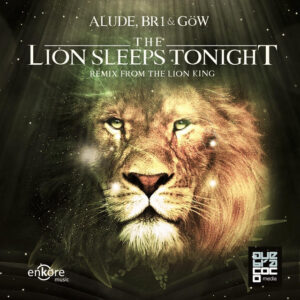 Linda Lou Burton posting from Sweetwaters Serena Camp, Ol Pejeta Conservancy, Nanyuki, Kenya – The lion may be the most misrepresented animal of all. Maybe it’s Disney’s fault, or maybe Solomon Ntsele’s. Solomon was a South African musician who wrote the song “Mbube” (lion) in 1939, which over time became known as “The Lion Sleeps Tonight,” which, well you know what Disney did with that. As well as folk artists, pop singers, and gospel choirs from pretty much all over the world who recorded the song. (You’re probably humming it right now.) But let’s get back to the lion, and its habits.
Linda Lou Burton posting from Sweetwaters Serena Camp, Ol Pejeta Conservancy, Nanyuki, Kenya – The lion may be the most misrepresented animal of all. Maybe it’s Disney’s fault, or maybe Solomon Ntsele’s. Solomon was a South African musician who wrote the song “Mbube” (lion) in 1939, which over time became known as “The Lion Sleeps Tonight,” which, well you know what Disney did with that. As well as folk artists, pop singers, and gospel choirs from pretty much all over the world who recorded the song. (You’re probably humming it right now.) But let’s get back to the lion, and its habits.
The lion neither lives in the jungle, as the song implies, nor does the lion sleep at night! Lions live on the savannah, wide-open grasslands, so they can SEE their prey, and run fast to catch something good to eat, like animals that slowly graze – zebras, or baby buffalo. And mostly, the lion HUNTS at night. Lions are cats, and in the daytime they like to sleep, relax, laze around. One reason is practical – they have few sweat glands, so conserve energy during the day and move around at night when it is cooler. And they have terrific night vision.
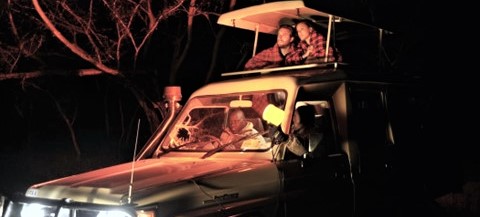 That is why we chose a NIGHT GAME DRIVE. Of all the parks we are scheduled to visit, only Ol Pejeta allows nighttime game drives. And tonight was our last night here. So, no brainer, we were climbing into an Ol Pejeta 4×4 at 9 PM, ready to prowl. Five of us were daring – besides me, and Rick, were Otis and Venita and Judy. Our local driver knew the routes, our spotter knew what to watch for; both certified to do, and go, just where allowed to insure the protection of both the animals we hoped to see, and US. We were not to put even a
That is why we chose a NIGHT GAME DRIVE. Of all the parks we are scheduled to visit, only Ol Pejeta allows nighttime game drives. And tonight was our last night here. So, no brainer, we were climbing into an Ol Pejeta 4×4 at 9 PM, ready to prowl. Five of us were daring – besides me, and Rick, were Otis and Venita and Judy. Our local driver knew the routes, our spotter knew what to watch for; both certified to do, and go, just where allowed to insure the protection of both the animals we hoped to see, and US. We were not to put even a 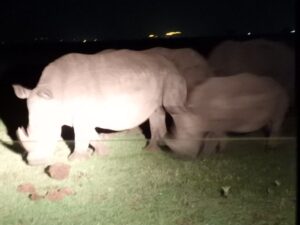 pinkie finger outside the vehicle; no sticking a camera out, or making noise. The top opened up, so standing was allowed. And we could have our side windows open. A stack of folded blankets was provided; warm plaid flannel. (Ol Pejeta’s photo.)
pinkie finger outside the vehicle; no sticking a camera out, or making noise. The top opened up, so standing was allowed. And we could have our side windows open. A stack of folded blankets was provided; warm plaid flannel. (Ol Pejeta’s photo.)
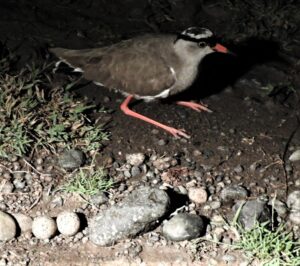 We came upon a few buffalo (curled on the ground asleep), and a herd of antelope who took off when they saw our light. We spotted a baby rhino and mom eating; maybe the ones we’d seen in the daylight? Then, something new – a spotted hyena. We stopped to watch; baby very wary of our sight and sound; mama patiently waiting for us to move on. “There’s a land plover,” our driver said, pointing to a small bird right at the edge of the road. “She’s guarding her eggs.” The land plover mother-to-be didn’t move, she stood her ground. See her two speckled eggs, right between the rocks? I’d never have noticed in the daylight.
We came upon a few buffalo (curled on the ground asleep), and a herd of antelope who took off when they saw our light. We spotted a baby rhino and mom eating; maybe the ones we’d seen in the daylight? Then, something new – a spotted hyena. We stopped to watch; baby very wary of our sight and sound; mama patiently waiting for us to move on. “There’s a land plover,” our driver said, pointing to a small bird right at the edge of the road. “She’s guarding her eggs.” The land plover mother-to-be didn’t move, she stood her ground. See her two speckled eggs, right between the rocks? I’d never have noticed in the daylight.
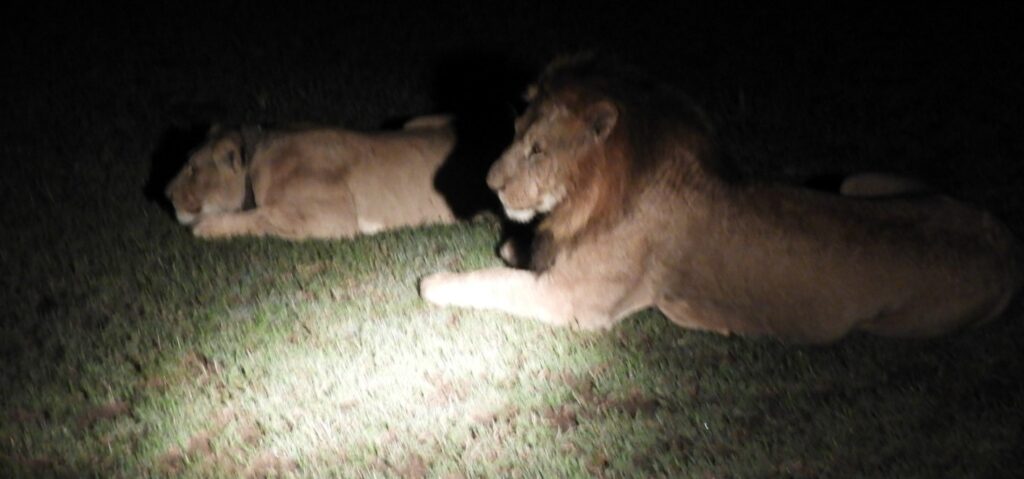 We turned down another road in the dark (and starry) night, and suddenly our spotter’s light flashed across our “gift of the evening.” Lions! Our driver pulled beside a male and female lion, right there, not 10 feet from our open windows. Everybody but me videoed the skit that played out next (I was too excited to switch camera settings in the dark).
We turned down another road in the dark (and starry) night, and suddenly our spotter’s light flashed across our “gift of the evening.” Lions! Our driver pulled beside a male and female lion, right there, not 10 feet from our open windows. Everybody but me videoed the skit that played out next (I was too excited to switch camera settings in the dark).
It was better than anything on Saturday Night Live as the male (Leo?) stood and began to roar. Not at us, but at his female companion (Muffin?). She gave him a “Not tonight, dear,” look, then got up and walked to the other side of our vehicle, definitely not in the mood. Leo followed her, and roared again. Muffin left her scent in the edge of a ditch (meaning, she peed) and lay back down. Leo checked her scent and got the message: Not gonna happen tonight. So Leo lay back down beside his lady love. “Oh there’s nothing romantic about it,” our driver said, explaining. “Mating is just a job in the animal kingdom.” 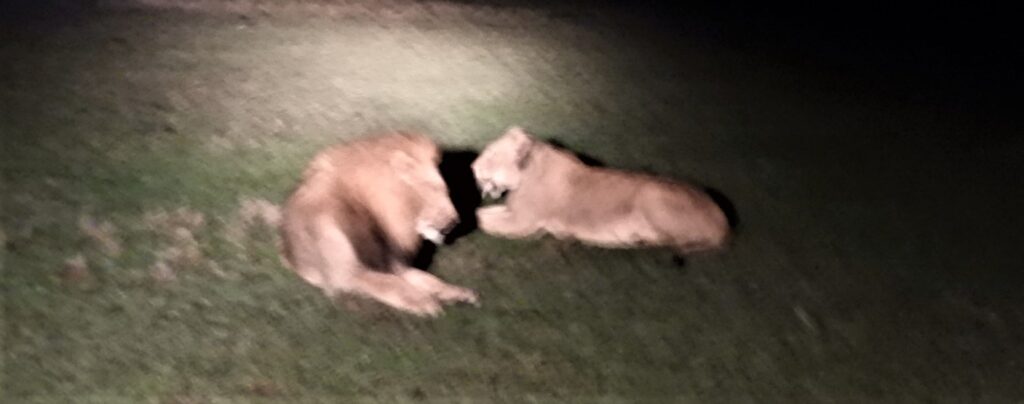
Solomon’s song was right about these lions, this night. They DID sleep. We laughed all the way back to camp.
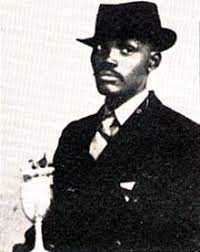 A postscript about Solomon’s song; he grew up a herdboy watching over cattle; the song was considered a lullaby, assuring his herd of “no danger” from the lions; another interpretation is sinister – perhaps a Zulu code about driving the British out of South Africa? Solomon died in 1962, impoverished, not profiting from all those millions of albums sold with his song on them, though his estate did file a lawsuit against Disney in 2006 with some benefit.
A postscript about Solomon’s song; he grew up a herdboy watching over cattle; the song was considered a lullaby, assuring his herd of “no danger” from the lions; another interpretation is sinister – perhaps a Zulu code about driving the British out of South Africa? Solomon died in 1962, impoverished, not profiting from all those millions of albums sold with his song on them, though his estate did file a lawsuit against Disney in 2006 with some benefit.
